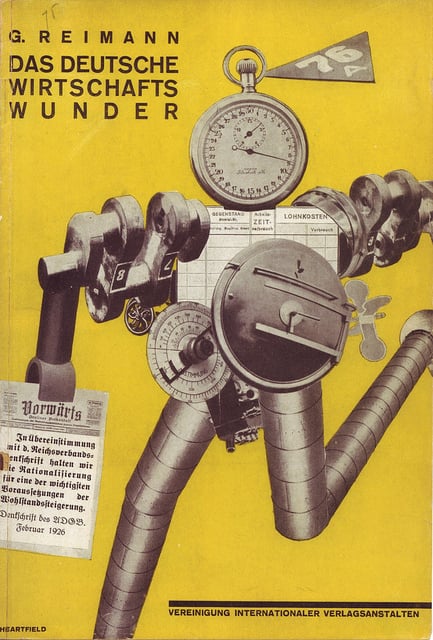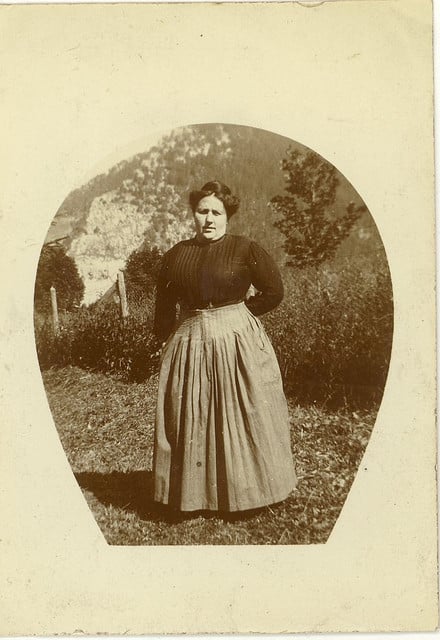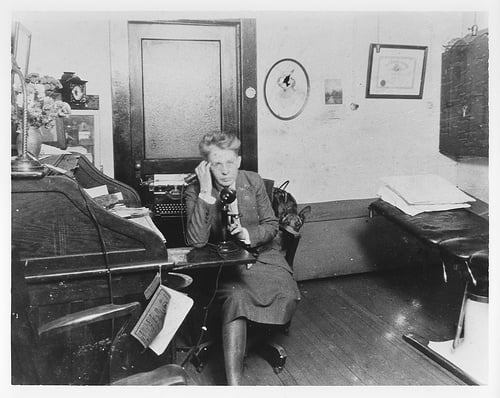The Clockwork Man (5)
By:
April 17, 2013

HILOBROW is pleased to present the fifth installment of our serialization of E.V. Odle’s The Clockwork Man. New installments will appear each Wednesday for 20 weeks.
Several thousand years from now, advanced humanoids known as the Makers will implant clockwork devices into our heads. At the cost of a certain amount of agency, these devices will permit us to move unhindered through time and space, and to live complacent, well-regulated lives. However, when one of these devices goes awry, a “clockwork man” appears accidentally in the 1920s, at a cricket match in a small English village. Comical yet mind-blowing hijinks ensue.
Considered the first cyborg novel, The Clockwork Man was first published in 1923 — the same year as Karel Capek’s pioneering android play, R.U.R.
“This is still one of the most eloquent pleas for the rejection of the ‘rational’ future and the conservation of the humanity of man. Of the many works of scientific romance that have fallen into utter obscurity, this is perhaps the one which most deserves rescue.” — Brian Stableford, Scientific Romance in Britain, 1890-1950. “Perhaps the outstanding scientific romance of the 1920s.” — Anatomy of Wonder (1995)
In September 2013, HiLoBooks will publish a gorgeous paperback edition of The Clockwork Man, with a new Introduction by Annalee Newitz, editor-in-chief of the science fiction and science blog io9. Newitz is also author of Scatter, Adapt, and Remember: How Humans Will Survive a Mass Extinction (2013) and Pretend We’re Dead: Capitalist Monsters in American Pop Culture (2006).
SUBSCRIBE to HILOBROW’s serialized fiction via RSS.
ALL EXCERPTS: 1 | 2 | 3 | 4 | 5 | 6 | 7 | 8 | 9 | 10 | 11 | 12 | 13 | 14 | 15 | 16 | 17 | 18 | 19 | 20
Besides, there was Arthur Wither’s story about the flapping ears and the queer conversation of the Clockwork man, his peculiar jerky movements, his sudden exhibitions of uncanny efficiency contrasted with appalling lapses. Once you had grasped the idea of his mechanical origin, it was difficult to thrust the Clockwork man out of your head. He became something immensely exciting and suggestive. If Gregg’s sense of humour had not been so violently tickled by the ludicrous side of the affair, he would have felt already that some great discovery was about to be revealed to the modern world. It had never occurred to him before that abnormal phenomena might be presented to human beings in the form of a sort of practical joke. Somehow, one expected this sort of thing to happen in solemn earnest and in the dead of night. But the event had taken place in broad daylight, and already there was mixed up with its queer unreality the most ridiculous tangle of purely human circumstance.
Allingham had an explanation for everything. He said that the loud noise was due to some kind of machine that this ingenious lunatic carried in his pocket. He argued that the rapid flight was probably to be accounted for by a sort of electric shoe. Nothing was impossible so long as you could adduce some explanation that was just humanly credible. And the strange antics of the Clockwork man, his sudden stoppings and beginnings, his “Anglo-Saxon” gestures and his staccato gait, all came under the heading of locomotor ataxia in an advanced form.
As the doctor concentrated upon a delayed tea, his mind lapsed into its usual condition of fretful scepticism. Gregg’s idea that the Clockwork man represented a mystery, if not a miracle, enraged him. At forty a man does not readily welcome discoveries that may upset his own world of accepted facts, and Allingham had long since given up the habit of following the latest results of scientific investigation. Years ago he had made his own small researches, only to discover that others were making them at the same time. He had had his gleamings in common with all the other students of his year. Everybody was having gleamings then of vast possibilities in medical science, especially in the direction of nervous pathology and the study of morbid diseases resulting from highly complex methods of living. There had been much sound work, a good deal of irresponsible mud-raking, and, in Allingham’s case, a growing suspicion that the human organism was not standing very well the strains imposed upon it by modern civilization. He wondered then if some experiments would not be made some day in the pursuit of evolutionary doctrines as applied to physiological progress – but that had been the most ephemeral of all his gleams.
He had been glad to abandon the hospitals in favour of a comfortable practice and the leisured life of a country town. Great Wymering had offered him plenty of distractions that soothed the slight wound to his vanity caused by the discovery that he had over-estimated his originality. In a few years much had happened that helped to confirm his new view of himself as a social creature with a taste for the amenities of existence. And then he had been able to keep up his cricket. In the winter there were bridge parties, amateur theatricals, dinner parties with quite ordinary people, local affairs into which a man whose health was under suspicion and whose sympathies were just perceptibly narrowing, could plunge without too much effort being required in order to rise to such occasions. And he had the witty temperament. Quite easily, he maintained a reputation for turning out a bonmot on the spur of the moment, something with a faint element of paradox. He would say such things as, “Only those succeed in life who have brains and can forget the fact,” or “To be idle is the goal of all men, but only the industrious achieve it.” When taunted by a young lady who suspected him of wasted talents, even genius, he retorted that “Genius is only an accumulation of neglected diseases.”
Latterly he had suffered from strange irritations not easily to be ascribed to liver, misgivings, a sense of having definitely accepted a secondary edition of himself. An old acquaintance would have detected at once the change in his character, the marked leaning towards conservatism in politics and a certain reactionary tendency in his general ideas. He was becoming fixed in his views, and believed in a stable universe. His opinions, in fact, were as automatic as his Swedish exercises in the morning and his apple before breakfast. There was a slight compensatory increase in his sense of humour, and there was his approaching marriage to Lilian Payne, the gifted daughter of a wealthy town councilor.
The last fact occupied a central place in his mind just at present, but it was also another source of irritation. Lilian was intellectual as well as fascinating, and the former attribute became more marked as they grew more intimate. Instead of charming little notes inviting him to tea he now received long, and, he was obliged to admit, quite excellent essays upon the true place of woman in modern life. He was bound to applaud, but such activity of mind was by no means to his taste. He liked a woman to have thoughts; but a thinking woman was a nuisance.
All these clamouring reforms represented to him merely a disinclination to bother about the necessary affairs of life, an evasion of inevitable evils, a refusal to accept life as a school of learning by trial and error. Besides, if women got hold of the idea of efficiency there would be an end to all things. They would make a worse muddle of the “mad dream” than the men. Women made fewer mistakes and they were temperamentally inclined towards the pushing of everything that they undertook to the point of violent and uncomfortable success.
Efficiency! How he hated the word! It reminded him of his own heart-breaking struggles, not only with the difficulties of an exacting science, but with the complexities of the time in which his youth had been spent, a time when all the intelligent young men had been trying to find some way out of the social evils that then existed – and still existed, as an ironical memorial to their futile efforts. In those days one scarcely dared to move in intellectual circles without having evolved one’s personal solution of the social problem, an achievement that implied a great deal of hard reading, attendance at Fabian meetings, and a certain amount of voluntary thinking.
If necessary, one could brush all that up again. How different life was, when it came to be lived; how unlike the sagacious prognostications of doubting youth! There was a substratum underneath all that surge of enquiry and inquisitiveness, all that worry and distress; and that was life itself, known and valued, something that one clung to with increasing strength. The mind grew out of its speculative stage and settled down to a careful consideration of concrete existence.
And then, with a sharp jar, his thoughts reverted to the consideration of another irritating circumstance, this ridiculous Clockwork man, in whom Gregg believed even to the extent of thinking it worth while stating the case for the incredible before a man years his senior in experience and rational thought.
Allingham got up and stood behind Gregg at the window. The latter raised his head a little as though to catch any words that might float across from the babel of excited voices opposite. But there was nothing clearly distinguishable.
“You see,” said Allingham, nodding his head and wiping his moustache with a handkerchief, “let the thing work on your mind and you ally yourself with these town gossips. They’ll talk this affair into a nine days wonder.”
Gregg shrugged his shoulders in silence. Presently he looked at his watch. “I wonder if Grey will be back soon.” Grey was the local inspector of police, in whose hands they had placed the business of rounding up the Clockwork man. Allingham had loaned out his car for the purpose.
“I doubt if we shall see him before midnight,” said the latter. “Even supposing he catches his man before dusk, which is unlikely, it will take him another hour or so to drive to the Asylum.”
Gregg failed to suppress an abrupt snigger. He lit a cigarette to cover his confusion. Once more he envisaged that flying figure on the horizon. “At the rate he was going,” he remarked, steadily, “and barring accidents, I should say he’s reached London by now.”
“There will be an accident,” retorted Allingham. “Mark my words, he won’t get very far.”

At that moment Mrs. Masters, the doctor’s elderly housekeeper, entered the room in order to clear away the tea things. She was a country woman, given to talking without reserve, except when the doctor’s eye fell upon her, as it did upon this occasion. But for once she evaded this check to her natural proclivities; she was not going to be cheated out of her share in the local gossip. She placed the tray on the table and made the visitor an excuse for her loquacity.
“Oh, Mr. Gregg, they say the Devil’s come to Great Wymering at last. I’m not surprised. To ’ear it, for the goings on in this town ’ave been something terrible since the war. What with the drinking and the young people doing just as they like.
“Have you heard anything fresh?” enquired Gregg, pleasantly.
“Only about old Mr. Winchape,” said Mrs. Masters, as she packed the tea things. “He’s seen the man that knocked the cricketers down with the bat. That is, if he is a man, but they do say — ”
“Where did Mr. Winchape see him?” broke in Allingham, abruptly.
“Along the path from Bapchurch, sir.” Mrs. Masters moderated her manner before the doctor’s searching eye. “Poor old Mr. Winchape, he’s not so young as he was, and it did give him a turn. He says he was ’urrying along so as to get ’ome in time for tea, and all of a sudden something flashed by ’im, so quick that he ’ardly realised it. He looked round but it was gone in no time. He reckons it was the Old Man ’imself. There was fire coming out of his mouth and ’is eyes was like two red ’ot coals — ”
Allingham stamped his feet on the carpet. “I will not listen to such talk, Mrs. Masters! A woman of your age and supposed sense to lend ear to such nonsense. I’m ashamed of you.”
Mrs. Masters trembled a little under the rebuke, but she showed no sign of repentance. “I’m only repeating what’s said,” she remarked. “An’ for all I know it might have been the Devil. It says in the Bible that he’s to be unbound for a thousand years, and I’m sure he might just as well come here as elsewhere for a start. The place is wicked enough.”
“Superstitious nonsense,” snorted Allingham. And he continued to snort at intervals while Mrs. Masters hastily collected cups and plates, and retreated with dignity to the kitchen.
“Perhaps you agree with Mrs. Masters?” said Allingham, as soon as the door was closed.
Gregg laughed and lowered himself into an easy chair. “Superstition, after all, is a perfectly legitimate although rudimentary form of human enquiry. These good people want to believe in the Devil. At the least opportunity they evoke his satanic majesty. They are quite right. They are simply using the only material in their minds in order to investigate a mystery.”
“A sort of glamour,” suggested Allingham, trying to look bored.
“If you like,” admitted Gregg, “only it does help them understand, just as all our scientific knowledge helps us to understand the future.”
“Why drag in the future,” said the other, opening his eyes quickly.
“Because,” said Gregg, purposely adopting a monotonous drawl as though to conceal his eagerness, “if my theory is correct, then I assume that the Clockwork man comes from the future.”
“It’s a harmless enough assumption,” laughed Allingham.
Gregg rested his head upon the back of the chair and puffed smoke out. “We will pass over the circumstance of his abrupt appearance at the top of the hill, for it is obvious that he might have come from one of the neighbouring villages, although I don’t think he did. You yourself admit that his manner of approach was startling, and that it almost seemed as though he had come from nowhere. But let that be. There are, I admit, as yet few facts in support of my theory, but it is at least significant that one of the first questions he asked should have been, not where he was but when he was.”
“I don’t quite follow you,” interjected Allingham.
“He asked Arthur Withers what year it was. Naturally, if he did come from the future, his first anxiety would be to know into what period of man’s history he had, possibly by some accident, wandered.”
“But how could he have come from the future?”
“Time,” said Gregg, quickly, “is a relative thing. The future has happened just as much as the past. It is happening at this moment.”
“Oh, well, you may be right there,” blustered Allingham, “I don’t know. I admit I’m not quite up to date in these abstruse speculations.”
RADIUM AGE SCIENCE FICTION: “Radium Age” is HILOBROW’s name for the 1904–33 era, which saw the discovery of radioactivity, the revelation that matter itself is constantly in movement — a fitting metaphor for the first decades of the 20th century, during which old scientific, religious, political, and social certainties were shattered. This era also saw the publication of genre-shattering writing by Edgar Rice Burroughs, Sax Rohmer, E.E. “Doc” Smith, Jack London, Arthur Conan Doyle, Aldous Huxley, Olaf Stapledon, Karel Čapek, H.P. Lovecraft, Charlotte Perkins Gilman, Yevgeny Zamyatin, Philip Gordon Wylie, and other pioneers of post-Verne/Wells, pre-Golden Age “science fiction.” More info here.
HILOBOOKS: The mission of HiLoBooks is to serialize novels on HiLobrow; and also, as of 2012, operating as an imprint of Richard Nash’s Cursor, to reissue Radium Age science fiction in beautiful new print editions. So far, we have published Jack London’s The Scarlet Plague, Rudyard Kipling’s With the Night Mail (and “As Easy as A.B.C.”), Arthur Conan Doyle’s The Poison Belt, H. Rider Haggard’s When the World Shook, Edward Shanks’s The People of the Ruins, William Hope Hodgson’s The Night Land, and J.D. Beresford’s Goslings. Forthcoming: E.V. Odle’s The Clockwork Man, Cicely Hamilton’s Theodore Savage, and Muriel Jaeger’s The Man with Six Senses. For more information, visit the HiLoBooks homepage.
SERIALIZED BY HILOBOOKS: Richard Connell’s “The Most Dangerous Game” | Jack London’s The Scarlet Plague | Rudyard Kipling’s With the Night Mail (and “As Easy as A.B.C.”) | Arthur Conan Doyle’s The Poison Belt | H. Rider Haggard’s When the World Shook | serialized between March and August 2012; Edward Shanks’ The People of the Ruins, serialized between May and September 2012; William Hope Hodgson’s The Night Land, serialized between June and December 2012; J.D. Beresford’s Goslings, serialized between September 2012 and May 2013; E.V. Odle’s The Clockwork Man, serialized between March and July 2013; and Cicely Hamilton’s Theodore Savage, serialized between March and August 2013.


